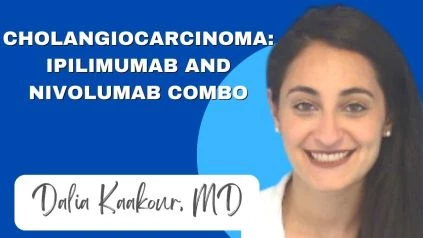Cholangiocarcinoma: Ipilimumab and Nivolumab Combo
Â
MOASC Poster Session 2022 (Cholangiocarcinoma Ipilimumab Nivolumab)
Hello, my name is Dalia Kaakour (clinical oncology). I’m a PGY three internal medicine resident at the University of California Irvine. And today, I’ll be presenting a poster. It’s actually a case series on three patients (patient population) with advanced cholangiocarcinoma, to who we saw durable responses to dual age it immunotherapy with ipilimumab and nivolumab.
Â
So what’s unique about this case series is that it provides three examples of patients that were that are still seeing responses to this combination immunotherapy (with nivolumab) after having failed multiple lines of therapy. Cisplatin, gemcitabine, or T can get capecitabine, and then pembrolizumab patients one and patients three were on pembrolizumab for just a short period of time.
Â
Each of them, just three cycles before CT imaging as well as clinical findings, suggested that they were not responding to therapy. So pembrolizumab was stopped for them at that time. And patient number two actually completed 27 cycles of pembrolizumab before we saw disease progression, both clinically and per CT imaging.
Â
So today, all three of these patients continue on dual agent immunotherapy with ipilimumab and nivolumab. One is on the 27th cycle. Now patients two and three are around the ninth cycle now, and they all continue to have a partial response on CT imaging and are clinically doing well. So this is remarkable.
Â
The closest trial that has been completed so far that kind of touches on this topic looks at 1AB and nivolumab combination immunotherapy on patients with advanced cholangiocarcinoma. However, it then switches to monotherapy after a short period of time. It does not look at the durable response with dual H immunotherapy.
Does This Demonstrated Superior Efficacy Compared to Other Trials (Nivolumab and Ipilimumab) In Progression Free Survival?
So this is why this is unique, and there are no clinical trials that have looked at this specific topic. So all these patients were diagnosed the earliest one, patient number three was in September 2018, and the other two were diagnosed in 2019. And the fact that they’re all still living and doing well today is quite significant.
Â
What Did The Second Patient With Celiac Lymphadenopathy Fair? And Was There Median Progression Free Survival?
And here we have figure four. Patient number two showed very significant findings in terms of the decrease in her tumor markers. So as you can see here, there’s a small blip. This is when the patient was on pembrolizumab and the CA 19-9.
Â
That’s in the black line here. Decreased significantly, and then this is after she was on for 27 cycles doing fine. Pembrolizumab. Disease control (response) rate, you can see the markers trended up and then started on the dual agent therapy. You see, the response here has settled down. So I think moving forward, it would be interesting to look at a larger number of patients who are on this or similar lines of therapy and just ask questions for investigation.
Â
Questions That Should Be Asked During Clinical Trial?
What’s the appropriate timeline that they need to be on this dual agent therapy for what sequence is optimal? Is it better to do a single agent than a dual agent? What combination of agents in that sense?Â
Â
Dalia Kaakour, MD – About The Author, Credentials, and Affiliations
Dr. Dalia Kaakour is a PGY-3 Resident at the University of California, Irvine in medical oncology.

